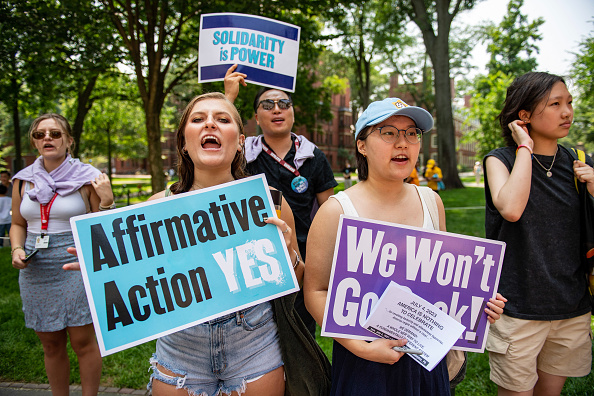The US Supreme Court banned racial preference in college admissions in 2023, but universities that have released admissions data for 2024 so far indicate that they are taking sharply divergent approaches in their new policies.
Yale College, like its Ivy League peers, agreed to stop considering race in admissions and to prevent reviewers from knowing an applicant’s self-identified race in 2023. But Yale, through the Common App application process shared by all Ivy Leagues schools and most top universities, offers an essay prompt in which students reflect on their “membership in a community,” an opportunity applicants could use to disclose their race. The Supreme Court’s ruling had mentioned that applicants should still be allowed to discuss “how race affected his or her life” in applications but added that “universities may not simply establish through application essays or other means the regime we hold unlawful today.”
In the Yale class of 2028, the first cohort admitted after the Supreme Court barred affirmative action, there were no changes in the proportion of black students compared to the year prior. This development is at odds with the school’s statement to the Supreme Court that it would see substantial declines in black representation without explicitly race conscious admissions. Yale claimed that race-neutral programmes aimed at increasing diversity would still “lead to a near 33% reduction in the number of African American students admitted.” Meanwhile, the Asian student population decreased slightly in the new incoming class, and the white student population increased slightly.
While elite schools’ admissions processes are notoriously opaque, the racial composition of incoming freshman classes offer some clues on the extent to which race is being considered by each university. The warnings about a sharp impending decline in black representation have been proven true at most of the other elite schools that have released admissions data thus far.
At MIT, the proportion of black students in its incoming class fell from 15% to 5% following the Supreme Court’s decision striking down affirmative action. Amherst University, an elite liberal arts school, also saw a sharp decline in black students — from 11% to 3% — for the class of 2028. Meanwhile, Tufts University, another elite private university, saw its share of black students decline from 7.3% to 4.7% in its first incoming class after the ruling.
Other universities have seen a more modest decline in black student admissions, such as the University of Virginia and Emory University, both prestigious public schools in the Southeast.
The continuity of some school’s racial composition following the ban on affirmative action suggests they could still consider race in admissions. But critics of affirmative action have been hesitant to attribute these developments to any illegal discrimination. The latest round of admission data is “indecipherable without detailed racial data about standardised tests scores, recruitment policies, advanced placement tests and other factors”, according to Edward Blum, the president of Students for Fair Admissions, which argued the case that ultimately ended affirmative action.
Yale, on the other hand, has explicitly argued in its 2022 joint amicus brief that the racial composition of its incoming class is not possible without implementing the type of racial discrimination that was barred by the Supreme Court. “The optimal means of creating a diverse student body—and thereby achieving Amici’s educational objectives— involves a limited consideration of race and ethnicity in admissions,” Yale argued. “No race-neutral alternative presently can fully replace race-conscious individualized and holistic review to obtain the diverse student body Amici have found essential to fulfilling their missions.”











Join the discussion
Join like minded readers that support our journalism by becoming a paid subscriber
To join the discussion in the comments, become a paid subscriber.
Join like minded readers that support our journalism, read unlimited articles and enjoy other subscriber-only benefits.
Subscribe